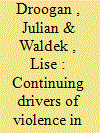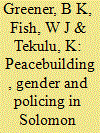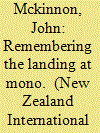| Srl | Item |
| 1 |
ID:
138957


|
|
|
|
|
| Summary/Abstract |
The Regional Assistance Mission to Solomon Islands (RAMSI) has provided a relative decline of violence in Honiara for over a decade. However, the combination of customary cultural practices utilised in negotiating status and power in Solomon Islands society with ongoing demographic and economic processes exacerbated by the period of foreign intervention has perpetuated underlying drivers of violence that are likely to reignite once RAMSI fully departs. The use of practices of social reciprocity and compensation in order to gain and effectively wield key resources such as cash, access to jobs and access to land is ongoing in Honiara, where new opportunities provide new pathways to utilising these practices by growing cohorts of youth. This article examines the use of these forms of negotiation in Honiara and argues that three ongoing processes are likely to drive future outbreaks of violence in the capital once RAMSI departs: a rapidly expanding urba; ongoing contestation over access to land; and the effects of international investment and presence of urban foreign enclaves.
|
|
|
|
|
|
|
|
|
|
|
|
|
|
|
|
| 2 |
ID:
073364


|
|
|
|
|
| Publication |
2006.
|
| Summary/Abstract |
In April 2006, rioting broke out in Honiara, Solomon Islands, following the parliamentary election of Snyder Rini. Occurring almost three years after the commencement of the Australian-led Regional Assistance Mission to Solomon Islands (RAMSI), the riots sparked intense deliberations about the nature of Australia's engagement with Solomon Islands and the success, or otherwise, of RAMSI. Within the context of discussions about state-building in Melanesia, this article seeks to outline challenges to the success of RAMSI. Ultimately, we argue that successful state-building in Melanesia is highly dependent upon awareness of local conditions, rather than simply the application of international best practice. Moreover, we suggest that unless the current approach is modified to accommodate local circumstances-including social and political structures and locally defined needs and desires-the existing growth of anti-RAMSI sentiment will continue to escalate. In conclusion, we offer policy-relevant suggestions aimed at assisting mission stakeholders to improve RAMSI's viability and impact.
|
|
|
|
|
|
|
|
|
|
|
|
|
|
|
|
| 3 |
ID:
085678


|
|
|
|
|
| Publication |
2008.
|
| Summary/Abstract |
The extensive experience of the United Nations in peacekeeping and peacebuilding is beginning to reap rewards in terms of lessons learned and improved peacebuilding practice. Evolving peacebuilding theory and ideas about best practice to promote sustainable peacebuilding have been boosted by the creation of the UN Peacebuilding Commission (PBC). This paper reviews sustainable peacebuilding theory and the potential contribution of the PBC to addressing some of the challenges faced by non-UN interventions such as the Australian-led Regional Assistance Mission to the Solomon Islands (RAMSI), as well as the US-led interventions in Iraq and Afghanistan. We argue that the adoption by non-UN interventions of peacebuilding
|
|
|
|
|
|
|
|
|
|
|
|
|
|
|
|
| 4 |
ID:
103958


|
|
|
|
|
| Publication |
2011.
|
| Summary/Abstract |
UN Security Council Resolution 1325 calls for a gender perspective to be integrated into the resolution of conflicts. This responsibility manifests itself in a number of more specific proposals, some easily assessable, others less so. In this paper, we begin by considering the success of the Regional Assistance Mission to Solomon Islands (RAMSI) - the poster child for peacebuilding efforts - at meeting these specific proposals. In light of this, we then go on to suggest ways in which RAMSI might meet greater success in fully integrating gender considerations in Solomon Islands by blending sensitivity to gender-based considerations together with a deeper sensitivity to cultural considerations, including cultural understandings of core notions such as 'policing' and 'justice'.
|
|
|
|
|
|
|
|
|
|
|
|
|
|
|
|
| 5 |
ID:
086374


|
|
|
|
|
| Publication |
2009.
|
| Summary/Abstract |
My visit to Mono took most of monday, 27 October 2008, the actual date of the 65th anniversary of the landing of the New Zealand 3rd Division's 8th Brigade on Mono. We left Honiara about 8 am.
|
|
|
|
|
|
|
|
|
|
|
|
|
|
|
|
| 6 |
ID:
100397


|
|
|
|
|
| Publication |
2010.
|
| Summary/Abstract |
Terrorism is designed to draw attention to particular issues and causes. Yet, the incidence of credit-taking (announcing one's responsibility for acts of terror) varies even though anonymity can undermine the clarity of the intended messages. This article offers an explanation of the variation in credit-taking that emphasizes how the competitive context in which groups operate shapes terrorists groups' need to cultivate support for their activities. Increasing numbers of terrorist organizations make it difficult for the supporters of terrorism to reward the perpetrators of particular attacks with their backing. Since such support is critical to the proper functioning of terrorist organizations, groups use claims of responsibility to distinguish themselves from those that had no hand in the violence. Consequently, variation in the probability of credit-taking fluctuates as a function of the number of active terrorist groups in a given theater of operations. This argument is contrasted with theories that suggest credit-taking is influenced by: the ideological mix of terrorist organizations; the willingness of governments to respond to terrorism using military force; state sponsorship; the depth of communal grievances; and the use of suicide attacks. The results, based on an analysis of transnational terrorism events conducted in the Israeli theater of operations between 1968 and 2004, suggest that competitive context is a consistently strong predictor of credit-taking. By implication, the results point to the utility of counter-terrorism strategies that interfere with the transmission of information between terrorist organizations and their supporters.
|
|
|
|
|
|
|
|
|
|
|
|
|
|
|
|